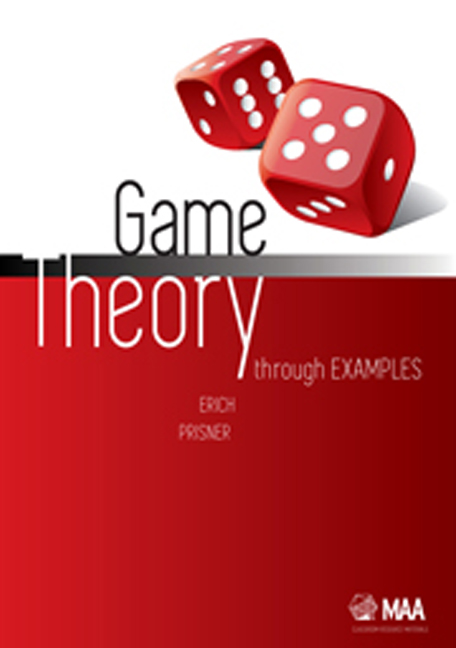Book contents
- Frontmatter
- Contents
- Preface
- 1 Theory 1: Introduction
- 2 Theory 2: Simultaneous Games
- 3 Example: Selecting a Class
- 4 Example: Doctor Location Games
- 5 Example: Restaurant Location Games
- 6 Using Excel
- 7 Example: Election I
- 8 Theory 3: Sequential Games I: Perfect Information and no Randomness
- 9 Example: Dividing A Few Items I
- 10 Example: Shubik Auction I
- 11 Example: Sequential Doctor and Restaurant Location
- 12 Theory 4: Probability
- 13 France 1654
- 14 Example: DMA Soccer I
- 15 Example: Dividing A Few Items II
- 16 Theory 5: Sequential Games with Randomness
- 17 Example: Sequential Quiz Show I
- 18 Las Vegas 1962
- 19 Example: Mini Blackjack and Card Counting
- 20 Example: Duel
- 21 Santa Monica in the 50s
- 22 Theory 6: Extensive Form of General Games
- 23 Example: Shubik Auction II
- 24 Theory 7: Normal Form and Strategies
- 25 Example: VNM POKER and KUHN POKER
- 26 Example: Waiting for Mr. Perfect
- 27 Theory 8: Mixed Strategies
- 28 Princeton in 1950
- 29 Example: Airport Shuttle
- 30 Example: Election II
- 31 Example: VNM POKER(2, r, m, n)
- 32 Theory 9: Behavioral Strategies
- 33 Example: Multiple-Round Chicken
- 34 Example: DMA Soccer II
- 35 Example: Sequential Quiz Show II
- 36 Example: VNM POKER(4, 4, 3, 5)
- 37 Example: KUHN POKER(3, 4, 2, 3)
- 38 Example: End-of-Semester Poker Tournament
- 39 Stockholm 1994
- Bibliography
- Index
14 - Example: DMA Soccer I
- Frontmatter
- Contents
- Preface
- 1 Theory 1: Introduction
- 2 Theory 2: Simultaneous Games
- 3 Example: Selecting a Class
- 4 Example: Doctor Location Games
- 5 Example: Restaurant Location Games
- 6 Using Excel
- 7 Example: Election I
- 8 Theory 3: Sequential Games I: Perfect Information and no Randomness
- 9 Example: Dividing A Few Items I
- 10 Example: Shubik Auction I
- 11 Example: Sequential Doctor and Restaurant Location
- 12 Theory 4: Probability
- 13 France 1654
- 14 Example: DMA Soccer I
- 15 Example: Dividing A Few Items II
- 16 Theory 5: Sequential Games with Randomness
- 17 Example: Sequential Quiz Show I
- 18 Las Vegas 1962
- 19 Example: Mini Blackjack and Card Counting
- 20 Example: Duel
- 21 Santa Monica in the 50s
- 22 Theory 6: Extensive Form of General Games
- 23 Example: Shubik Auction II
- 24 Theory 7: Normal Form and Strategies
- 25 Example: VNM POKER and KUHN POKER
- 26 Example: Waiting for Mr. Perfect
- 27 Theory 8: Mixed Strategies
- 28 Princeton in 1950
- 29 Example: Airport Shuttle
- 30 Example: Election II
- 31 Example: VNM POKER(2, r, m, n)
- 32 Theory 9: Behavioral Strategies
- 33 Example: Multiple-Round Chicken
- 34 Example: DMA Soccer II
- 35 Example: Sequential Quiz Show II
- 36 Example: VNM POKER(4, 4, 3, 5)
- 37 Example: KUHN POKER(3, 4, 2, 3)
- 38 Example: End-of-Semester Poker Tournament
- 39 Stockholm 1994
- Bibliography
- Index
Summary
Question: Is this the mathematician talking?
Slomka: I hate mathematics.
Question: But you majored in mathematics?
Slomka: Yes, since I didn't know in advance that it is so cruel. Interview with Mirko Slomka, coach of Schalke 04, in the newspaper Tagesspiegel, 2007.
Prerequisites: Chapters 1, 2, and 12.
Imagine you are in a poker tournament and the organizer approaches your chair, taps you on the shoulder, and tells you to pass less often. Would you be amused? In a liberal society, we have become accustomed to the fact that organizations and governments leave us freedom. Of course, there are always rules such as pay your taxes, don't speed, and don't smoke during class, but we want them to be minimal, and we enjoy the freedom of selecting our own moves. In many games, players' behavior can be influenced in subtle ways by those in charge. All they need to do is to change the rules. Increase taxes for flying and the people will more often travel by car or train.
In 1994 FIFA, the World Soccer Association, changed the rules for assigning points in soccer tournaments. Before that, a win counted as 2 points, a draw 1 point, and a loss as 0 points. With the new rule, a win counted 3 points. FIFA's aim was to encourage teams to play more offense, after years of defensive, unattractive play.
- Type
- Chapter
- Information
- Game Theory Through Examples , pp. 102 - 109Publisher: Mathematical Association of AmericaPrint publication year: 2014



